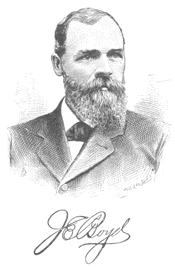In April 1891 after the State Legislature had enacted a law to organize the newly adquired territory into Boyd County, U.S.Adams and Sanford Parker of O'Neill toured the area. Near the center of the county, the men saw a plateau well above the Ponca Creek valley, with an excellent view in all directions. There was already a 14 by 16 foot saloon run by Bill Stearns, a soddy or two, and a wagon load of lumber to be used to build a store was in the yard.
In May Adams returned and surveyed a town site, "...so people could select their locations, get their lumber over from O'Neill for homes and shops." Choosing the name "Spencer," (the name of Whiting's army captain) Ed Angel was sent across the river to "Sizer," a post office in Holt County, to be sure there were no other town in Nebraska by that name.
Parker started a bank, J.P.Mann built a store, and a newspaper, the "Free Lance," was owned by H.E.Bonesteel and edited by J.C.Santee. Scott Angel, who had a store at the Whiting Bridge in 1890, moved to Spencer as soon as it was "definitely located." A post office opened in June, Max Arendt established the Phoenix Hotel, John Kloke built a butcher shop, James Meyer put up a livery barn, and Charles Metz had a restaurant.
By the Fourth of July, Spencer looked like a typical frontier town. A celebration was in order. A big feature in those days was to have Indians participate in the festivities. It was agreed to supply the tribe from a nearby reservation with meat for the occasion. Camping south of the Catholic Church, between 200-300 Indians showed up, along with their chiefs "Yellow Horse" and "War Bonnet." By noon the supply of meat was exhausted as well as Spencer's funds to supply more. Things were getting a little tense when a delegation from Butte arrived and offered to supply the Indians with all the meat they wanted if they would come to their celebration. The offer was accepted. The people of Spencer completed their celebration with prayers of thanksgiving that no scalps were lost.
Spencer's original plat, dated September 5, 1891, was filed in Knox County. Building continued at a fever pitch, as people scrambled to claim homesteads and establish businesses in the growing community.
A schoolhouse, built in the fall of 1892, was quickly replaced by a three-room structure. A number of schools contracted to educate Indian children in an integrated system. The school was remodeled in 1920 and served until 1966, when county schools consolidated with larger town schools, causing an overflow of pupils. A new K-6, kitchen, and recreation hall were built at that time. When Spencer-Naper district was created and a new gym was built to accomodate the great interest in sports. This K-12 fully accredited school now educates over half of the students in the county.
A real celebration was held when the railroad arrived in 1902. It meant that everything could come by rail instead of the long trip by team and wagon from O'Neill.
The first car in Spencer was a bright red Buick "buggy type" driven over from O'Neill by Fred Sedlacek in 1908.
Electricity was installed in 1911. People gladly discarded their gas plants for the more convenient light bulb. Spencer had its own power plant until 1927, when it contracted with the Spencer Hydro Plant, and later with NPPD.
In 1915 the Spencer library board received $8,000 from the Carnegie Commission for a new building. Dr.E.B.Bradley and his wife donated many books and keepsakes and in 1958, a sizable donation from the Bradley estate was made for continued improvements and upkeep.
In the 1920s, with over 700 residents, there was quite a building boom. A sewer system was put in, and paving on main streets. New businesses were added and where older buildings had burned, new ones were built to take their place. The first talking movies were shown in Spencer in 1929.
Since Spencer's location is above the flood plain, it has been spared many of the natural disasters that have befallen other towns. The blizzard of 1949 is remembered as "the big one."
Spencer's population in 1980 was nearly 600. The community has many fine organizations, five active churches, the county fair, and a good selection of businesses and shops.
From material submitted by Melvin Jacoby, Box 331, Spencer, NE 68777 and Louis W. Klasna.
ADDITIONAL MATERIAL: "The History of Spencer" from Boyd County, 75th Jubilee Book", 1966.


